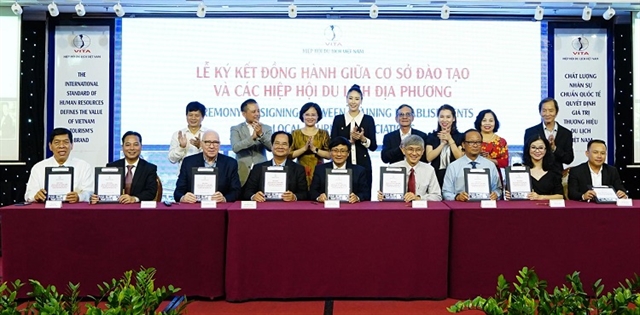 Society
Society


|
| The Việt Nam Association of Tourism and associations of tourism in the Cửu Long (Mekong) Delta, HCM City, and Bà Rịa-Vũng Tàu, Bình Thuận, Bình Định and Tây Ninh provinces sign agreements on training and development of human resources in hotel management with the Imperial International Hotel College and the Finance – Marketing University. — VNA/VNS Photo |
HCM CITY — Education and training of high-quality human resources in tourism and hospitality is key to improve productivity and the competitive capacity of Việt Nam’s tourism sector, tourism experts have said.
Nguyễn Hữu Thọ, chairman of Việt Nam Association of Tourism, said labour productivity remains low compared with other countries.
Singapore productivity is 15 times higher than Việt Nam, Japan 10 times, and Thailand 5 times, Thọ said.
The persistence of theory-focused education and little practical application in Việt Nam requires enterprises to offer workplace-based retraining programmes for their employees, he said at a conference held on Wednesday in HCM City.
The labour turnover rate in the tourism and hospitality industry, which is struggling with a lack of qualified human resources, is relatively higher than other industries, he said.
Education and training of high-quality human resources in tourism and hospitality needs to offer 50-70 per cent of practice time and the remaining 30-50 per cent for theory, he added.
Đào Mạnh Hùng, chairman of the Việt Nam Tourism Education Association, said Việt Nam is one of the fastest-growing travel destinations in the world.
However, the training of high-quality human resources in tourism and hospitality has failed to keep up with the increasing demand for employment.
The tourism sector needs about 40,000 more labourers a year, particularly skilled workers and qualified professionals, while the number of graduates is around 15,000 a year, according to the Việt Nam National Administration of Tourism.
In HCM City, around 50 colleges and universities offer training courses on tourism and hospitality. But only 60 per cent of employment demand is met.
The robust development of upscale hotels and resorts has widened the gap between education and employment, Hùng said.
There is an abundant supply of students with acedemic and theoretical education but a shortage of skilled personnel, he said.
New training model
The Việt Nam Association of Tourism has partnered with the Imperial International Hotel College to develop a 16-week quality training model of international standards as part of an effort to bridge the gap between abundant supply of university graduates and shortage of skilled workers at four to five-star hotels.
The hotel school model where students are taught and practice at the five-star Imperial Vũng Tàu Hotel, with 70 per cent of practice time, has been chosen as a pilot model for training of qualified professionals in the hospitality and tourism industry.
Lưu Thị Hương Hoài, deputy head of the Administration of Tourism’s Hotel Department, said the hotel school model aims to develop a better trained workforce in the hospitality and tourism industry.
At the conference, the Việt Nam Association of Tourism and associations of tourism in the Cửu Long (Mekong) Delta, HCM City, and Bà Rịa-Vũng Tàu, Bình Thuận, Bình Định, and Tây Ninh provinces signed agreements on training and development of human resources in hotel management with international standards with the Imperial International Hotel College and the University of Finance – Marketing. — VNS




